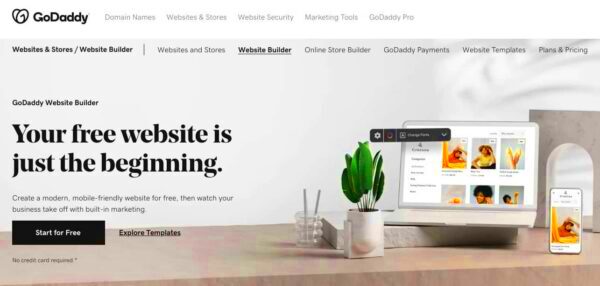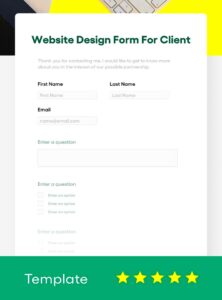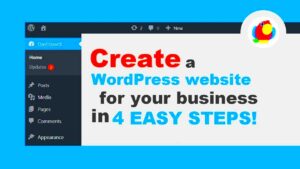Welcome to the digital age! If you’re a small business owner, you might be wondering if creating a website is worth your time and investment. The short answer? Absolutely! In 2024, having an online presence isn’t just an option; it’s a necessity. In this blog post, we’ll explore the top website builders specifically designed for small businesses, making it easier than ever for you to get started on your online journey.
Why Small Businesses Need a Website

Having a website is crucial for small businesses, and here’s why:
- Establish Credibility: A professionally designed website boosts your business’s legitimacy. Customers are likely to trust a company with an online presence over one that doesn’t.
- Market Your Business: Your website serves as a 24/7 marketing tool. It allows you to showcase your products, services, and achievements to a wider audience without geographical boundaries.
- Improve Customer Engagement: A website provides various ways to engage with your customers, like blogs, newsletters, or even chat support. This engagement can lead to building loyal relationships.
- Enhance Customer Support: You can offer immediate answers to frequently asked questions through FAQs or contact forms, improving customer satisfaction and reducing inquiry load.
- Gain Insights: With tools like Google Analytics, you can gather valuable data about your visitors. This information helps you understand what works and what doesn’t, allowing you to refine your strategies.
- Cost-Effective Advertising: Compared to traditional advertising methods, online marketing can be more budget-friendly, especially for small businesses trying to manage costs.
In summary, having a website in 2024 is not just about being online; it’s about creating opportunities for your small business to grow and thrive.
Key Features to Look for in Website Builders
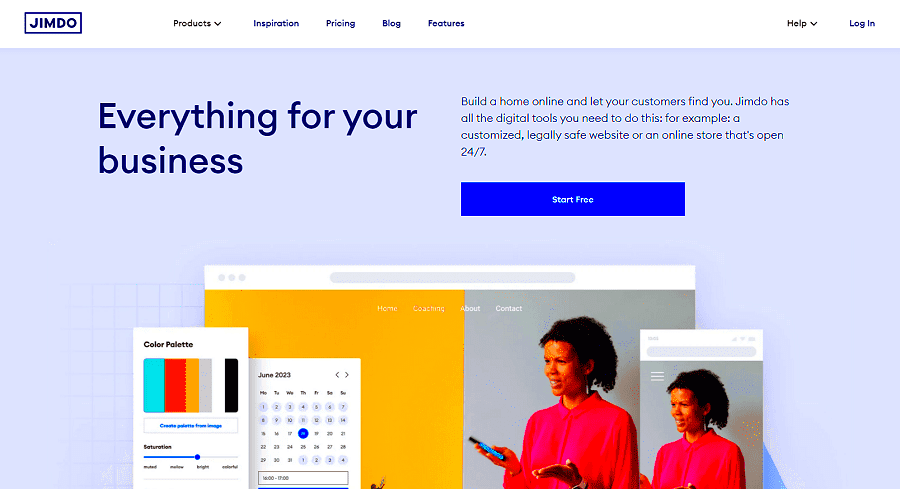
When you’re on the hunt for the perfect website builder for your small business, there are several key features that can make or break your experience. After all, having a great website isn’t just about aesthetics; it’s also about functionality and ease of use. Here are some vital features you should look for:
- Drag-and-Drop Interface: A user-friendly drag-and-drop interface simplifies the design process, making it accessible even to those with limited tech skills.
- Mobile Responsiveness: Make sure your website looks great on mobile devices. A mobile-friendly site is crucial as more users access websites via their smartphones.
- Customizable Templates: Look for a variety of templates that align with your brand. Customization features let you tweak colors, fonts, and layouts to suit your style.
- SEO Capabilities: An SEO-friendly website builder should include essential tools to optimize your site for search engines. This can help increase your visibility online.
- Integration with Third-Party Tools: Ensure that the builder can easily integrate with tools like email marketing services, payment gateways, and social media platforms.
- Customer Support: Reliable customer support is vital. Look for builders that offer 24/7 support, tutorials, and community forums.
- Affordability: Budget is a major consideration. Many builders offer tiered pricing plans, so find one that provides the best value for the features you need.
By keeping these key features in mind, you’ll be one step closer to finding a website builder that meets your small business needs in 2024!
Top Website Builders for Small Businesses in 2024
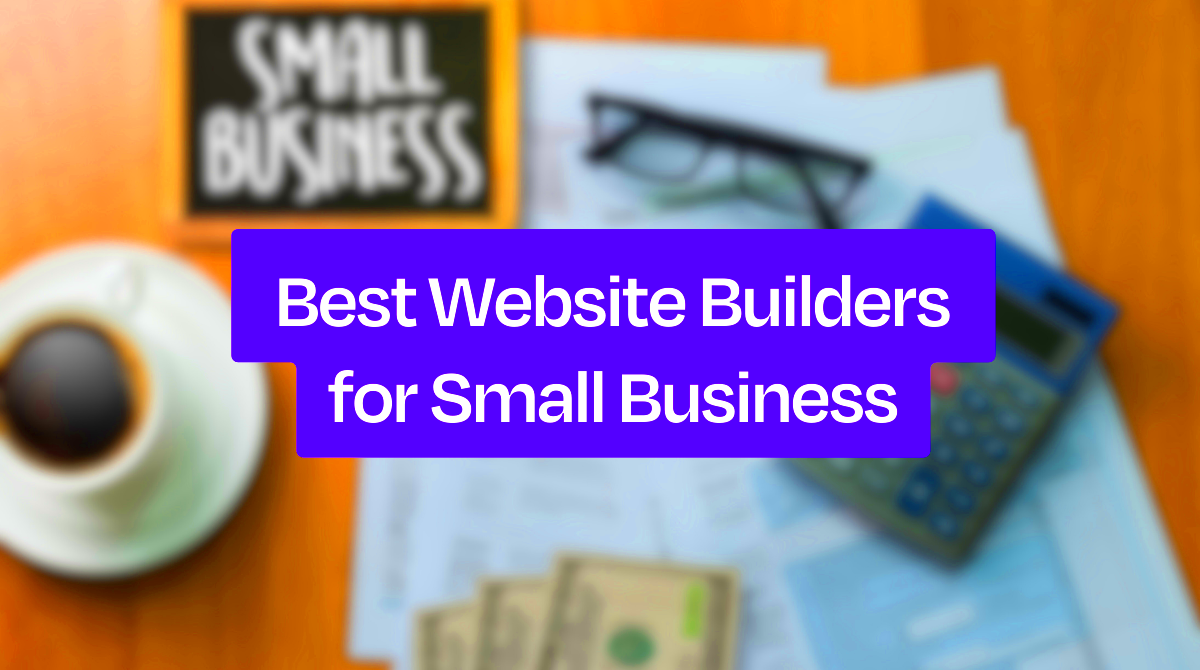
As we dive into 2024, the website builder landscape has evolved, offering small businesses a variety of powerful tools to establish their online presence. Let’s break down some of the top contenders:
| Website Builder | Main Features | Pricing |
|---|---|---|
| Wix |
|
Starts from $14/month |
| Squarespace |
|
Starts from $16/month |
| Shopify |
|
Starts from $29/month |
| WordPress.com |
|
Starts from $4/month |
Choosing the right website builder depends on your business needs, budget, and personal preferences. Each of these platforms offers unique strengths that can help enhance your online presence and connect with your audience effectively in 2024.
1. Wix
If you’re on the hunt for a user-friendly website builder that offers a ton of features without needing to learn any coding, Wix may just be your best bet. Launched in 2006, Wix has skyrocketed in popularity, especially among small businesses looking to establish their online presence effortlessly.
One of the standout features of Wix is its drag-and-drop interface. This means you can easily place elements like text, images, and buttons exactly where you want them on your site. You don’t need to be a design whiz—anyone can create a visually appealing website! Here’s a breakdown of why Wix might be the ideal choice for you:
- Templates Galore: Wix offers a vast library of over 500 customizable templates that cater to various industries. Whether you’re in retail, hospitality, or professional services, there’s something for everyone.
- Mobile Optimization: All templates are mobile responsive, ensuring your site looks great on smartphones and tablets without any extra effort from your side.
- App Market: With the Wix App Market, you can enhance your website’s functionality by integrating various apps like online booking systems, social media feeds, and email marketing tools.
- SEO-Friendly: Wix comes with built-in SEO tools, helping your site rank better on search engines. You can easily set up meta tags, alt text for images, and more.
In a nutshell, Wix’s combination of ease-of-use, versatility, and powerful features makes it a fantastic option for small businesses looking to establish their digital footprint in 2024.
2. Squarespace
When it comes to stunning design and aesthetics, Squarespace often sets the standard. Perfect for creative entrepreneurs, artists, and small businesses that prioritize visually striking websites, Squarespace seamlessly marries functionality with beauty.
With its stunning templates, Squarespace offers a variety of options that are not just easy to use but also look absolutely gorgeous. One of the key features of this platform is:
- Design Quality: Squarespace templates are professionally designed and highly customizable. Every template is 100% responsive, guaranteeing that your site will look just as breathtaking on mobile devices as it does on desktops.
- Integrated E-Commerce: If you’re planning to sell products, Squarespace has robust e-commerce capabilities. You can manage inventory, track orders, and handle payments with ease—all from one platform.
- Built-in Analytics: Knowing how your website is performing is crucial. Squarespace provides built-in analytics tools so you can track visitors, conversions, and other vital metrics without needing external software.
- Strong SEO Features: Certified SEO-friendly, Squarespace helps you optimize your content easily. You can manage title tags, meta descriptions, and even generate an XML sitemap.
In short, if you’re seeking a beautifully designed website with powerful features and an intuitive interface, Squarespace is worth considering for your small business in 2024. With its exceptional design options and innovative tools, your site will not only stand out but also convert visitors into loyal customers!
3. Shopify
If you’re in the e-commerce game or planning to dive in, Shopify is a name that you’ll want to keep on your radar. Launched in 2006, Shopify has skyrocketed to popularity thanks to its user-friendly interface and wide array of features tailored specifically for online selling.
One of the standout features of Shopify is its ability to get you up and running quickly. With a simple setup process, you can have your online store live in no time. The platform offers over 70 beautifully designed themes, and the best part? They’re all customizable. So whether you’re selling handmade crafts or tech gadgets, you can make your store reflect your brand’s personality.
Shopify also shines when it comes to managing your inventory. You can easily add, update, and track your products, making life a little less chaotic for the busy small business owner. Moreover, the platform supports various payment options, which means your customers can choose how they want to pay—whether that’s through credit cards, PayPal, or other digital wallets.
Another perk? Shopify’s extensive app marketplace gives you access to thousands of applications that integrate seamlessly with your store. From SEO tools to marketing solutions, you can add functionalities that will help your business grow.
Let’s not forget the customer support. Shopify offers 24/7 assistance via chat, email, and phone, so you’re never left hanging if you run into trouble.
In summary, if you’re looking for a robust, feature-rich platform dedicated to e-commerce, Shopify is absolutely worth considering for your small business in 2024.
4. WordPress.com
When it comes to website building, WordPress.com is often recommended as one of the go-to platforms, especially for small businesses. With its origins dating back to 2003, it has proven itself as a versatile powerhouse, capable of catering to a wide array of needs—from blogs to stunning business websites.
What sets WordPress.com apart is its user-friendliness. You don’t need to be a tech whiz to create a professional-looking website. WordPress provides an intuitive interface that’s ideal for beginners while also offering advanced features for those who are a bit more tech-savvy. You can choose from hundreds of themes that can easily be customized to align with your business branding.
WordPress.com is also particularly great for content-oriented businesses. Its blogging capabilities are second to none, allowing you to share your thoughts, insights, and updates seamlessly. With built-in SEO tools, you can optimize your content to help your site rank higher on search engine results.
Another feature that small business owners appreciate is the variety of plugins available. Although the extent of plugins is less on WordPress.com compared to WordPress.org, you still have access to essential tools that help with social media integration, email marketing, and analytics.
Security and uptime are also big considerations, and WordPress.com takes care of those for you. Hosting is included, and you benefit from automatic updates and backups, letting you focus on running your business instead of worrying about tech issues.
Overall, if you’re looking for a straightforward, flexible platform that grows with your business, WordPress.com is a fantastic choice for small business owners in 2024.
5. Weebly
Weebly is a user-friendly website builder that’s perfect for small businesses wanting to establish a professional online presence without any technical know-how. Launched in 2006, Weebly has built a solid reputation for its simple drag-and-drop interface and a strong focus on eCommerce features. Whether you’re a café owner, a freelance graphic designer, or a boutique shop manager, Weebly can cater to your needs with style and ease.
One of Weebly’s standout features is its intuitive editor, which allows you to create and edit pages fluidly. Simply click, drag, and drop – it’s that easy! Additionally, Weebly offers a range of customizable templates that are responsive, ensuring your site will look great on both desktops and mobile devices.
Another significant advantage is Weebly’s built-in eCommerce capabilities. With tools for managing inventory, processing payments, and setting up a secure storefront, you can easily sell your products online. Plus, Weebly supports various payment options, including PayPal, Stripe, and Square, making transactions a breeze.
Here are some key features of Weebly:
- Easy-to-use drag-and-drop interface
- Customizable templates
- Integrated eCommerce functionalities
- Mobile optimization
- SEO tools for better visibility
Overall, Weebly is an excellent choice for small businesses looking to create an effective online presence with minimal hassle. It gives you the tools you need to succeed without overwhelming you with complex features.
6. GoDaddy Website Builder
GoDaddy is a name you might already associate with domain registration and web hosting, but their website builder is quite impressive too! In 2024, GoDaddy’s Website Builder has continued to grow in popularity among small businesses, and for good reason. This tool is designed for those who want to get online quickly and efficiently, with a focus on both simplicity and functionality.
What sets GoDaddy apart is its AI-driven design assistance, called the “GoDaddy Website Builder.” This feature helps users create their website from scratch based on their answers to a few simple questions. Think of it as having a virtual assistant guiding you through the setup process. This is perfect for business owners who may not know where to start.
In addition to that, GoDaddy has a myriad of features designed to make managing your site easy and effective:
- Responsive templates: All templates are mobile-friendly, ensuring that your site looks great on any device.
- Integrated social media tools: Share your website easily on various platforms to reach more customers.
- SEO optimization: Built-in tools help improve your search engine rankings.
- eCommerce capabilities: Suitable for businesses that want to sell products directly from their site.
GoDaddy also excels in customer support, offering 24/7 assistance which is crucial for small businesses that need reliable help when issues arise. If you’re looking for an easy-to-use website builder that gets you up and running quickly, GoDaddy is definitely worth considering.
11. Comparative Analysis of the Top Builders
When it comes to selecting the right website builder for your small business, it’s essential to weigh the features, usability, and performance of each available option. In 2024, the competition has intensified, and numerous builders are vying for your attention. Let’s dive into a comparative analysis of some of the top website builders to help you make an informed decision.
The following table outlines key features of each builder:
| Website Builder | Ease of Use | Templates | E-commerce Features | SEO Tools |
|---|---|---|---|---|
| Wix | Very User-Friendly | 500+ | Integrated Shopping Cart | Basic SEO Tools |
| Squarespace | Intuitive with Slight Learning Curve | 100+ | Advanced E-commerce Options | Comprehensive SEO Features |
| Shopify | Easy for E-commerce, Moderate for Others | 70+ | Best in Class | Good SEO Tools |
| Weebly | Simple Drag-and-Drop | 50+ | Basic E-commerce | Limited SEO Options |
In summary, each builder presents its unique strengths: Wix stands out for its user-friendliness and diverse templates, while Squarespace shines in aesthetics and SEO tools. Shopify is a clear winner for e-commerce, although it may not cater as well to non-e-commerce sites. Weebly is a strong contender for beginners. Choosing the right platform ultimately depends on your business needs and budget.
12. Pricing and Plans Overview
Understanding the pricing and plans available for different website builders is crucial for any small business owner. In 2024, many builders have flexible plans to suit varying budgets and business needs. Here’s a brief overview of the pricing structures of the top builders:
- Wix:
- Free Plan: Limited features with Wix ads
- Combo Plan: $14/month – removes ads
- Unlimited Plan: $18/month – great for entrepreneurs
- Business Plan: $23/month – for small businesses
- Squarespace:
- Personal: $16/month – basic features
- Business: $23/month – includes e-commerce features
- Basic Commerce: $27/month – full e-commerce capabilities
- Advanced Commerce: $49/month – advanced shipping and discounts
- Shopify:
- Basic: $39/month – essential features
- Shopify: $105/month – additional reports
- Advanced: $399/month – advanced analytics
- Weebly:
- Free Plan: Basic features with ads
- Pro: $12/month – removing ads and offering basic e-commerce
- Business: $25/month – full e-commerce capabilities
These pricing plans reflect the flexibility many website builders offer. Small business owners should carefully consider not just the upfront costs, but also long-term value, especially if you plan on scaling. Check out each builder’s offerings to see which fits your budget while meeting your business needs!
Tips for Choosing the Right Website Builder for Your Business
Finding the perfect website builder for your small business can feel overwhelming, especially with so many options out there. But don’t worry! Here are some essential tips to help you make the right choice:
- Identify Your Needs: Start by asking yourself what you need your website to do. Is it primarily for showcasing your products, capturing leads, or perhaps selling online? Make a list of must-have features.
- Ease of Use: Look for a builder that’s user-friendly, especially if you’re not tech-savvy. Check if it offers drag-and-drop functionality and intuitive navigation.
- Templates and Customization: Does the builder provide customizable templates that align with your brand? Ensure you can easily modify colors, fonts, and layout to create a unique look.
- Mobile Responsiveness: With a growing number of users browsing on mobile devices, your website needs to look great on phones and tablets. Confirm that the builder automatically optimizes for mobile.
- SEO Capabilities: Good SEO features can help improve your visibility on search engines. Look for tools that make it easy to optimize your content.
- Support and Resources: Check if the builder offers reliable customer support, tutorials, or community forums. This help can be invaluable when you’re stuck.
- Pricing Plans: Finally, consider your budget. Some builders are free, while others require paid subscriptions. Ensure the cost aligns with your business goals.
By considering these factors, you’ll be better equipped to choose a website builder that not only meets your needs but also grows with your business!
Conclusion
In a rapidly digitalizing world, having a strong online presence is crucial for small businesses. Choosing the right website builder can make all the difference in establishing that presence effectively. With numerous options available for 2024, it’s essential to evaluate what each platform offers in relation to your unique business requirements.
Remember, the goal isn’t just to create a website; it’s to build a space that resonates with your audience and encourages them to engage. Whether you prioritize ease of use, aesthetics, or advanced features, there’s a website builder out there that fits the bill. As you explore your options, keep in mind the tips outlined above—tailor them to your specific situation, and you’ll be on track to launching a stunning website.
Ultimately, investing time in selecting the right website builder can lead to increased traffic, higher conversions, and ultimately, business growth. So take your time, do your research, and watch your online presence thrive!

